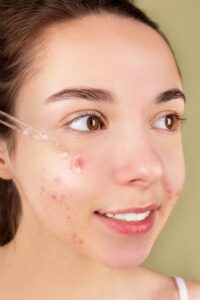The Best Solutions for Skin Problems

Healthy, glowing skin is a common desire for many of us, but with so many skin concerns, it can be difficult to know where to start. From acne to eczema, there are a variety of skin concerns that can affect us at any age. Fortunately, there are many effective solutions available to help address these common skin concerns and achieve healthy, radiant skin.
Acne
Acne is a common skin concern that affects millions of people worldwide. It occurs when hair follicles become clogged with oil and dead skin cells, leading to pimples, blackheads, and whiteheads. While acne can affect anyone at any age, it’s most commonly seen in teenagers and young adults.
One of the best solutions for acne is to establish a consistent skincare routine. This should include gentle cleansing with a mild cleanser, followed by the application of a non-comedogenic moisturizer. Using products that contain salicylic acid or benzoyl peroxide can also help to unclog pores and reduce inflammation.
It’s important to avoid picking at or squeezing pimples, as this can worsen inflammation and lead to scarring. In addition, a healthy diet that’s rich in fruits, vegetables, and whole grains can also help to promote clear, healthy skin.
Eczema
Eczema, also known as atopic dermatitis, is a chronic skin condition that causes dry, itchy patches on the skin. It’s often seen in infants and young children, but it can also affect adults. While the exact cause of eczema is unknown, it’s believed to be related to an overactive immune system.
One of the best solutions for eczema is to keep the skin moisturized. This can be done by applying a thick, fragrance-free moisturizer after bathing or showering. It’s also important to avoid harsh soaps and detergents, as these can further dry out the skin and exacerbate eczema symptoms.
In addition, wearing loose-fitting, breathable clothing can help to prevent irritation and promote healing. For severe cases of eczema, a dermatologist may recommend prescription-strength topical or oral medications.
Rosacea
Rosacea is a chronic skin condition that causes redness, flushing, and visible blood vessels on the face. It’s most commonly seen in people with fair skin and tends to affect women more than men. While the exact cause of rosacea is unknown, it’s believed to be related to a combination of genetic and environmental factors.
One of the best solutions for rosacea is to avoid triggers that can exacerbate symptoms. These can include spicy foods, alcohol, and hot beverages. In addition, using gentle, fragrance-free skincare products and wearing sunscreen can also help to reduce redness and irritation.
For severe cases of rosacea, a dermatologist may recommend prescription-strength topical or oral medications. Laser treatments and other cosmetic procedures may also be effective in reducing redness and improving the appearance of blood vessels.
Hyperpigmentation
Hyperpigmentation refers to dark patches or spots on the skin that are caused by an overproduction of melanin. This can be caused by a variety of factors, including sun exposure, hormonal changes, and certain medications.
One of the best solutions for hyperpigmentation is to wear sunscreen daily. This can help to prevent further damage from UV rays and promote healing of existing dark spots. In addition, using products that contain alpha hydroxy acids (AHAs) or retinoids can help to exfoliate the skin and reduce the appearance of hyperpigmentation.
For severe cases of hyperpigmentation, a dermatologist may recommend prescription-strength topical treatments or cosmetic procedures such as chemical peels or laser resurfacing.

Dry Skin
Dry skin is a common skin concern that can affect people of all ages. It occurs when the skin lacks sufficient moisture, leading to flakiness, roughness, and itching. Dry skin can be caused by a variety of factors, including genetics, environmental factors, and certain medical conditions.
One of the best solutions for dry skin is to establish a consistent skincare routine that includes gentle cleansing and regular moisturizing. It’s important to use products that are specifically formulated for dry skin, such as rich, creamy moisturizers that contain ingredients like ceramides, hyaluronic acid, and glycerin.
In addition, avoiding long, hot showers and baths can help to prevent further drying of the skin. Instead, opt for lukewarm water and limit your bathing time to 10-15 minutes. Using a humidifier in your home can also help to add moisture to the air and prevent dryness.
For severe cases of dry skin, a dermatologist may recommend prescription-strength topical treatments or oral medications. It’s important to seek medical advice if you’re experiencing persistent dryness, as it can be a sign of an underlying medical condition.
In conclusion, there are many effective solutions available to help address common skin concerns such as acne, eczema, rosacea, hyperpigmentation, and dry skin. Establishing a consistent skincare routine that includes gentle cleansing and regular moisturizing is key, and it’s important to use products that are specifically formulated for your skin type and concern. Avoiding triggers that can exacerbate symptoms and seeking medical advice if necessary can also help to promote healthy, radiant skin. Remember, healthy skin is a reflection of a healthy body and mind, so be sure to practice self-care and maintain a healthy lifestyle for the best possible results.




